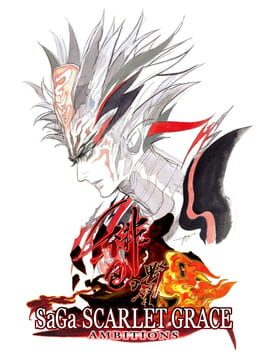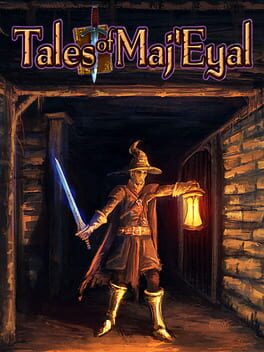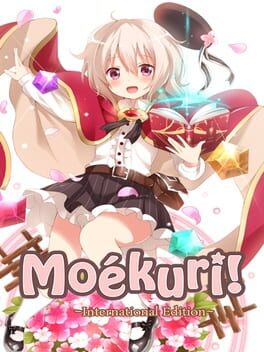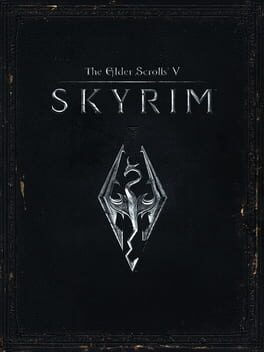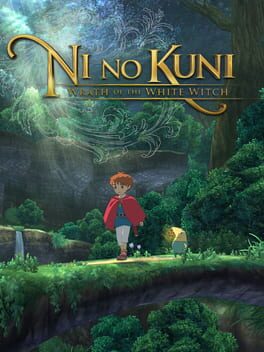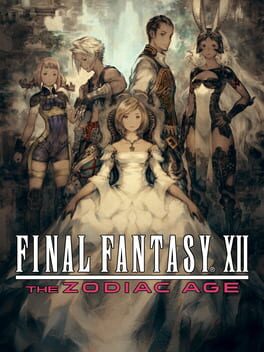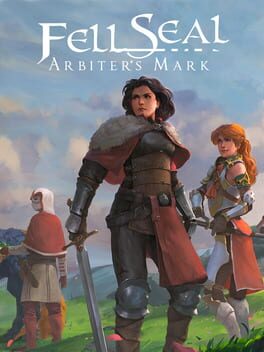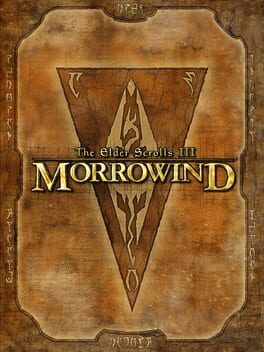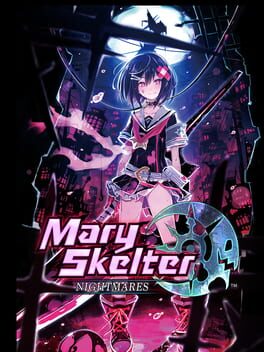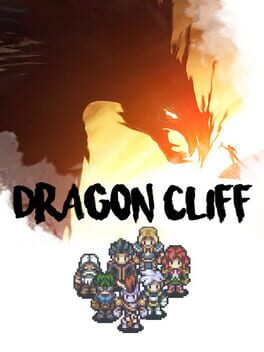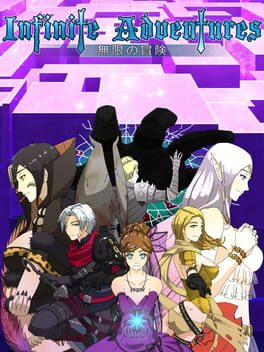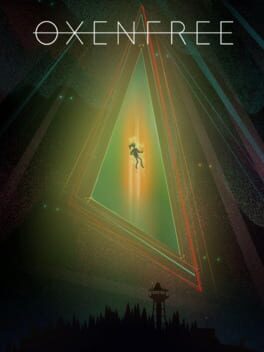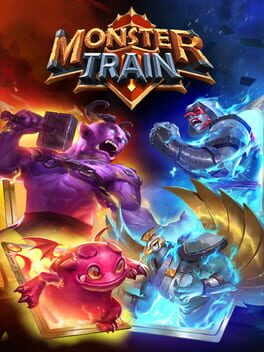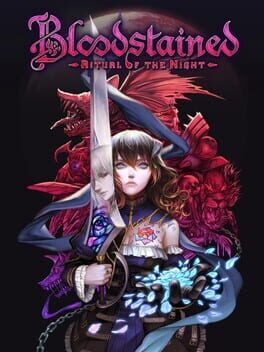jademonkey
Scarlet Grace has the best combat of any JRPG I've ever played. I don't want to write an entire treatise on the mechanics, but with all of the timeline manipulation, counters and interrupts, unite attack mechanic (if defeating an actor brings two actors of the same team adjacent on the timeline, a special attack happens), status effects, damage types, delayed spells, cover mechanic, etc. each turn becomes a puzzle leading to easily the most dynamic decision making I've ever experienced in the genre. The combat can be brutally hard -- there's almost always a risk of death, even in regular battles. That said, it's exceptionally fair -- if you use your toolbox appropriately and come up with the right strategy, you'll make it through. Also the final boss, holy crap. They put phases inside the phases and I kept thinking I was gonna die, but somehow scraped by. Top notch send off.
Outside of the combat, though, the game is very stripped down. You essentially run around a world map to trigger events or combat at nodes. Towns are just a menu and the events are largely limited to simple dialogue with character models making poses to show emotion. As with most SaGa games, the overarching story is a bit vague, but still fairly enjoyable. The side quests have stronger writing, though they can still be rather strange and a bit stilted at times. I'm down for that, but it's definitely not for everyone.
Oh, there's 4 different main characters to chose from at the start, each with a different scenario. I chose Balmaint, the executioner. His story is very on-rails for a SaGa game, but I liked Balmaint, Arthur, and company, so it was all good.
I'm a big fan of Kenji Ito's music, and Scarlet Grace is no exception. Similarly, I absolutely love Tomomi Kobayashi's illustrations, and was very happy to see a couple actually show up in game. The character designs are great, though graphics themselves clearly come from a lower budget Vita game.
Scarlet Grace: Ambitions is easily my favorite SaGa game to this point.
Outside of the combat, though, the game is very stripped down. You essentially run around a world map to trigger events or combat at nodes. Towns are just a menu and the events are largely limited to simple dialogue with character models making poses to show emotion. As with most SaGa games, the overarching story is a bit vague, but still fairly enjoyable. The side quests have stronger writing, though they can still be rather strange and a bit stilted at times. I'm down for that, but it's definitely not for everyone.
Oh, there's 4 different main characters to chose from at the start, each with a different scenario. I chose Balmaint, the executioner. His story is very on-rails for a SaGa game, but I liked Balmaint, Arthur, and company, so it was all good.
I'm a big fan of Kenji Ito's music, and Scarlet Grace is no exception. Similarly, I absolutely love Tomomi Kobayashi's illustrations, and was very happy to see a couple actually show up in game. The character designs are great, though graphics themselves clearly come from a lower budget Vita game.
Scarlet Grace: Ambitions is easily my favorite SaGa game to this point.
2012
I think ToME is my most played game of all time. It's an excellent roguelike with a huge variety of character options. The game is certainly overlong, and random spikes of difficulty can be frustrating, though both issues are mitigated by the default mode allowing for multiple lives. I don't play it much these days since it can really chew through time, but I'm sure I'll be back when the upcoming DLC finally releases. Well, if it does.
2015
1996
This was one of my absolute favorite childhood games. There's no separating nostalgia from quality here for me. I played through each of the minigames more times than I can count growing up, and loved every minute of it. I still had a blast when I picked the game up a couple of years ago. There are just so many fun powers to play around with, and the Kirby vibe is great.
I wanted to like Ni No Kuni more than I did. The art was gorgeous, the music a cut above, and the story oozed charm. I genuinely loved the familiar design, and the puns in the names frequently made me smile. The games environments were consistently gorgeous and interesting.
Unfortunately, most of the gameplay just didn't work for me. It felt like I was fighting the game more than I was fighting the on-screen enemies. The basic combat UI was frustrating -- I don't want to be navigating a clunky ring to select an ability in real time! Allied AI was completely brain dead. It wasn't uncommon to issue an attack order to my currently controlled familiar only for that familiar to walk brainlessly into an ally who happened to walk between him and the enemy.
I found most of the progression systems to be tedious. Catching a new familiar was entirely down to luck and could take upwards of an hour when I was looking for a specific one. Evolving a familiar required resetting to level one, and then waiting for a few hours of gameplay until it caught back up with its previous stats. Loot pinata enemies did some to allay that issue, but it was too late for my enjoyment. The food system for boosting a familiars stats was straight up frustratingly slow to make use of. It was still beneficial to make partial use of and avoid some of the tedium, but left me feeling like I wasn't doing what I could to improve my team.
The take heart and give heart mechanic was overused and struck me as lazy. It felt like the majority of the emotional conflicts in the game were just handled with magic, rather than the characters having to grow. That said, there were a few scenes end game that showed true growth in the characters outside of just using magic to solve problems.
The pacing was absolutely terrible. I almost quit the game multiple times at the start because I just wanted to be let loose. I think it took around 10 hours of play time to finally be able to even capture new familiars. The story failed to really capture my interest until the last couple of acts: almost 30 hours in for my pace. Part of this is probably my own fault: I did the vast majority of side quests as they became available. I usually enjoy playing a game that way, but it only increases frustration with pacing. It didn't help that the sidequests were frequently tedious (collect familiar or kill familiar with certain moves) or just uninspired fetch quests.
I think that wraps up most of my stronger feelings on why the game just didn't quite work for me. In the end, I don't regret playing it. The positives I mentioned at the start certainly carried me through the litany of issues I encountered along the way. That said, I don't plan to replay the game at any point.
Unfortunately, most of the gameplay just didn't work for me. It felt like I was fighting the game more than I was fighting the on-screen enemies. The basic combat UI was frustrating -- I don't want to be navigating a clunky ring to select an ability in real time! Allied AI was completely brain dead. It wasn't uncommon to issue an attack order to my currently controlled familiar only for that familiar to walk brainlessly into an ally who happened to walk between him and the enemy.
I found most of the progression systems to be tedious. Catching a new familiar was entirely down to luck and could take upwards of an hour when I was looking for a specific one. Evolving a familiar required resetting to level one, and then waiting for a few hours of gameplay until it caught back up with its previous stats. Loot pinata enemies did some to allay that issue, but it was too late for my enjoyment. The food system for boosting a familiars stats was straight up frustratingly slow to make use of. It was still beneficial to make partial use of and avoid some of the tedium, but left me feeling like I wasn't doing what I could to improve my team.
The take heart and give heart mechanic was overused and struck me as lazy. It felt like the majority of the emotional conflicts in the game were just handled with magic, rather than the characters having to grow. That said, there were a few scenes end game that showed true growth in the characters outside of just using magic to solve problems.
The pacing was absolutely terrible. I almost quit the game multiple times at the start because I just wanted to be let loose. I think it took around 10 hours of play time to finally be able to even capture new familiars. The story failed to really capture my interest until the last couple of acts: almost 30 hours in for my pace. Part of this is probably my own fault: I did the vast majority of side quests as they became available. I usually enjoy playing a game that way, but it only increases frustration with pacing. It didn't help that the sidequests were frequently tedious (collect familiar or kill familiar with certain moves) or just uninspired fetch quests.
I think that wraps up most of my stronger feelings on why the game just didn't quite work for me. In the end, I don't regret playing it. The positives I mentioned at the start certainly carried me through the litany of issues I encountered along the way. That said, I don't plan to replay the game at any point.
I liked Final Fantasy 12 quite a lot early on. The combat and character development systems were just different enough from what I was used to to pique my interest. The story had a fairly strong start, and I liked all of the characters (even Vaan and Penelo). The presentation of Ivalice was excellent, and I actually liked trudging around the deserts.
However, as the game progressed, I found myself losing interest and becoming more frustrated. Once I had decent gambits set up, combat largely became a matter of just letting the game play itself. I don't think this is actually a bad thing in and of itself. Being able to operate at such a strategic level has its charms. Unfortunately, the combat animations were just flat out boring. This was further worsened by the lack of interesting abilities. Technicks just weren't cool or useful, and the magic system was quite standard. The martial classes felt far too similar to one another to feel like there was much more diversity in the party than "casts spells" or "doesn't cast spells".
Unfortunately, my growing dissatisfaction wasn't limited to the combat and character building. The main party interactions felt very limited -- I really wanted to see the characters play off each other more. I may have had this feeling in part due to the extraordinarily large amount of dungeon crawling that separated each tidbit of story. Even on x2 or x4 speed, it ended up feeling like an eternity between story elements. Now, this is partially my fault. I don't think I should have hit as many of the hunts early on as I did. I think the story also hit a pretty hard lull about halfway in, which didn't really resolve itself until the very final portion of the game. On top of that, there were several story elements that just felt like they came out of left field or were cool but didn't end up playing into the storyline nearly enough for my liking.
In the end, I don't think it's a bad game, and I think the people who love it are justified. It just didn't really click with me the way I would have wanted. I lost my motivation to keep slogging through the dungeons in the penultimate dungeon. It was just too damn long for me. I ended up reading a synopsis of that dungeon's story elements and then watching a lets play of the final boss and ending FMV. I have no regrets about making that decision-- I actually ended up enjoying the ending of the game, but don't think I would have if I'd spent another 5 hours slogging through dungeons to get there.
However, as the game progressed, I found myself losing interest and becoming more frustrated. Once I had decent gambits set up, combat largely became a matter of just letting the game play itself. I don't think this is actually a bad thing in and of itself. Being able to operate at such a strategic level has its charms. Unfortunately, the combat animations were just flat out boring. This was further worsened by the lack of interesting abilities. Technicks just weren't cool or useful, and the magic system was quite standard. The martial classes felt far too similar to one another to feel like there was much more diversity in the party than "casts spells" or "doesn't cast spells".
Unfortunately, my growing dissatisfaction wasn't limited to the combat and character building. The main party interactions felt very limited -- I really wanted to see the characters play off each other more. I may have had this feeling in part due to the extraordinarily large amount of dungeon crawling that separated each tidbit of story. Even on x2 or x4 speed, it ended up feeling like an eternity between story elements. Now, this is partially my fault. I don't think I should have hit as many of the hunts early on as I did. I think the story also hit a pretty hard lull about halfway in, which didn't really resolve itself until the very final portion of the game. On top of that, there were several story elements that just felt like they came out of left field or were cool but didn't end up playing into the storyline nearly enough for my liking.
In the end, I don't think it's a bad game, and I think the people who love it are justified. It just didn't really click with me the way I would have wanted. I lost my motivation to keep slogging through the dungeons in the penultimate dungeon. It was just too damn long for me. I ended up reading a synopsis of that dungeon's story elements and then watching a lets play of the final boss and ending FMV. I have no regrets about making that decision-- I actually ended up enjoying the ending of the game, but don't think I would have if I'd spent another 5 hours slogging through dungeons to get there.
This review contains spoilers
I wrote this review 5 years ago for a different site... it's a bit longer than I'd normally post here, but whatever.
Morrowind launched as I was finishing my Freshman year of high school. Being a huge fan of RPGs, I'd followed Morrowind's development for a full year before it launched. In that time, I played and replayed the Daggerfall demo many times since my parents wouldn't allow me to buy a game with nudity in it (lmao). To say that I was hyped would be an understatement. It's the one and only game I've ever pre-ordered, and I even spent the summer saving for a new computer since I was only able to hit 10-15 FPS with the clunker I had when it released. I spent hundreds of hours exploring and trying out different types of characters in the early 2000s.
I returned to the game in 2007 and 2012 (after playing Oblivion and Skyrim), but just couldn't get properly invested and quit about 10-15 hours in each time. I finally came back for another round this month, and finished a 50ish hour playthrough, including the Main Quest, 5 guilds (Thieves, Mages, Morag Tong, Imperial Cult, House Hlaalu), and the main storylines of both expansions. This was my first time actually completing the main quest and Bloodmoon, though I'd made it a fair ways into both in the past. Here are my thoughts:
Story:
You're (possibly) a reincarnated ancient general recruited by a (sort of) Goddess/Demon to fulfill a prophesy and bring the end of a Tribunal of (formerly) mortal (sort of) Gods who usurped divine power from the heart of the (kind of) god responsible for the creation of Nirn and (big maybe) killed you in a previous life. Also, there's another dude who was with the Tribunal at the time and was totally corrupted into some sort of seductive vampire thing that's weaseling his way into people's dreams and making their faces fall off to make room for face tentacles. It's cool and trippy as heck. That said, it doesn't really provide much room for emotional involvement, which puts it behind a lot of its contemporary JRPGs and some CRPGs like Baldur's Gate 2 in my eyes. Still, though, rad stuff.
The Guild stories are mostly just, even for the time, boring fetch quests, and the vast majority of the miscellaneous quests around the world are a bit too simplistic to really get invested in.
Tribunal has some really neat concepts in the story, but it's one of the few games that I just can't accept the actions I'm forced to take. I don't want to help the dude that's clearly sending assassins after me or the very clearly crazy (former) goddess, dammit. I wanna help the guy who makes mecha dinosaurs.
Bloodmoon has a neat story, even if it's a bit frustrating to actually play. I like Norse mythology and re-enacting legendary deeds, so I was all on board there.
World:
It's an open-world game, so the quality of the world is pretty darn important. Luckily, Morrowind delivers some bombshells in this department. The cities are excellent in concept, ranging from pseudo-middle eastern architecture, to giant mushroom towers, to crabshell megastructures, to a series of big ol' floating cookie cutter buildings. Dungeons were also neat, especially the creepy and alien daedric dungeons, and the almost-steampunk dwemer ruins.
There's a lot of background everywhere you look, which really fleshes out this alien world you become a part of. Despite being fairly uninteresting, the guilds do give you a feeling of actually being a part of a fictional group and having to work your way to the top. Frankly, in 2001 or now, it was only the bizarre world and lore, along with the freedom, that really kept me in the game.
All of that said, the World would have been WAY better aesthetically if it weren't so damn gray and muddy looking in almost every region. The Ancestral Tombs and various caves were all way too similar to one another. More importantly, the NPCs were, by and large, very flat and uninteresting. Only a few NPCs were given any amount of back story, and far less were written with a unique voice to their dialogue. Despite all of the really cool concepts, the actual human aspect just wasn't there, generally speaking. I think the one liners common in JRPGs of the era did more to add character to the towns than most of the NPCs in Morrowind.
The books were amazing and weird and I love Michael Kirkbride.
Music:
Freaking Jeremy Soule put out some major bangers. I still get a bit of chill when I hear the drums and flutes at the beginning of the main theme. The epic scope of the main theme really gets you ready to go on an adventure, and the battle music perfectly builds tension. One of the all time greats, in my humble opinion, and I usually prefer stuff more in the range of Nier/Automata or FFXIII-2. Or I guess Devil May Cry to be compare it to something more contemporary.
Gameplay:
2002: Ugh, I guess I can live with this.
2019: Yikes.
Seriously, it's bad. No, a "dice roll" system does not make it feel like I'm playing a D&D campaign. Not even a little bit. It just feels bad. I literally remember wishing the gameplay was either Baldur's Gate style RTWP or properly action back in the day. The movement and animations are stiff as all hell, even for the time, creating a very clunky game feel. On top of that enemies mostly just walk straight at you and get stuck in the environment at some point or another, even with mods to improve combat AI.
Each and every mechanic is spectacular broken in some way. Why click "Bribe 10 Gold" 100 times when you can just make a "Charm 100 pts for 1 second" spell and bypass the whole ordeal. The unarmored skill didn't actually increase your armor like it showed (easily fixed with mods these days, of course). Hoo boy, alchemy was nuts with those fortify intelligence potions. 100% chameleon enchants so nothing ever sees you again? I shouldn't have to go grab some boots that turn your eyes off just to get around at a reasonable clip. Hyperlinking text Wikipedia-style is great for reading dry information, but not so much as a conversation system in a video game. The level up mechanics were bizarre and encouraged grinding misc skills just for stat points. The incentive to maximize endurance first was also obnoxious. While the text directions for quests were generally good enough, the 10% that weren't REALLY made wish there were quest markers. I can still get plenty immersed with a red dot on a map, but having to bring up a wiki because the game gives you outright incorrect instructions takes me right on out to frustration-ville.
Oh yeah, the spawn rate in Bloodmoon was crazy and felt like a bad mod.
With all of that said, the jump spell is awesome and one of my favorite ways to get around a game map ever. This may seem like a minor thing, but it was legitimately a major source of my enjoyment this playthrough.
Mods:
They're mostly necessary to fix the absolutely broken parts of the game. You can also make things look a lot prettier.
Unfortunately, I've never found any combination of mods that leads to me enjoying the actual gameplay. While some of the issues are able to be fixed with balancing mods, the overall game-feel just isn't good.
This time around, I played with Morrowind Rebirth (which actually fixed a lot of my issues with balance) and some mods to change the leveling system and such. I wanted to tackle at least some of Tamriel Rebuilt since a friend/former roommate of mine was an admin for the mod for over a decade. Unfortunately, I was running on fumes to just get through the main quest, and the expansions were already more content than I really wanted.
I think the mods for Oblivion and Skyrim are a lot more transformative, but each game had a 5-10x bigger playerbase than the previous, and obviously better technical assets to work with (even if the engine didn't change as much as people would have liked).
Final Thoughts:
Despite how big of a mess the game is, I managed to have fun with many playthroughs in the early 2000s, and it was great to get back to the game and FINALLY finish the main quest and expansion quests. I think I'm well and truly done playing the game at this point, since it took me 15 years to be ready for another go this time, but I will always love reading the bat-shit crazy lore.
Morrowind launched as I was finishing my Freshman year of high school. Being a huge fan of RPGs, I'd followed Morrowind's development for a full year before it launched. In that time, I played and replayed the Daggerfall demo many times since my parents wouldn't allow me to buy a game with nudity in it (lmao). To say that I was hyped would be an understatement. It's the one and only game I've ever pre-ordered, and I even spent the summer saving for a new computer since I was only able to hit 10-15 FPS with the clunker I had when it released. I spent hundreds of hours exploring and trying out different types of characters in the early 2000s.
I returned to the game in 2007 and 2012 (after playing Oblivion and Skyrim), but just couldn't get properly invested and quit about 10-15 hours in each time. I finally came back for another round this month, and finished a 50ish hour playthrough, including the Main Quest, 5 guilds (Thieves, Mages, Morag Tong, Imperial Cult, House Hlaalu), and the main storylines of both expansions. This was my first time actually completing the main quest and Bloodmoon, though I'd made it a fair ways into both in the past. Here are my thoughts:
Story:
You're (possibly) a reincarnated ancient general recruited by a (sort of) Goddess/Demon to fulfill a prophesy and bring the end of a Tribunal of (formerly) mortal (sort of) Gods who usurped divine power from the heart of the (kind of) god responsible for the creation of Nirn and (big maybe) killed you in a previous life. Also, there's another dude who was with the Tribunal at the time and was totally corrupted into some sort of seductive vampire thing that's weaseling his way into people's dreams and making their faces fall off to make room for face tentacles. It's cool and trippy as heck. That said, it doesn't really provide much room for emotional involvement, which puts it behind a lot of its contemporary JRPGs and some CRPGs like Baldur's Gate 2 in my eyes. Still, though, rad stuff.
The Guild stories are mostly just, even for the time, boring fetch quests, and the vast majority of the miscellaneous quests around the world are a bit too simplistic to really get invested in.
Tribunal has some really neat concepts in the story, but it's one of the few games that I just can't accept the actions I'm forced to take. I don't want to help the dude that's clearly sending assassins after me or the very clearly crazy (former) goddess, dammit. I wanna help the guy who makes mecha dinosaurs.
Bloodmoon has a neat story, even if it's a bit frustrating to actually play. I like Norse mythology and re-enacting legendary deeds, so I was all on board there.
World:
It's an open-world game, so the quality of the world is pretty darn important. Luckily, Morrowind delivers some bombshells in this department. The cities are excellent in concept, ranging from pseudo-middle eastern architecture, to giant mushroom towers, to crabshell megastructures, to a series of big ol' floating cookie cutter buildings. Dungeons were also neat, especially the creepy and alien daedric dungeons, and the almost-steampunk dwemer ruins.
There's a lot of background everywhere you look, which really fleshes out this alien world you become a part of. Despite being fairly uninteresting, the guilds do give you a feeling of actually being a part of a fictional group and having to work your way to the top. Frankly, in 2001 or now, it was only the bizarre world and lore, along with the freedom, that really kept me in the game.
All of that said, the World would have been WAY better aesthetically if it weren't so damn gray and muddy looking in almost every region. The Ancestral Tombs and various caves were all way too similar to one another. More importantly, the NPCs were, by and large, very flat and uninteresting. Only a few NPCs were given any amount of back story, and far less were written with a unique voice to their dialogue. Despite all of the really cool concepts, the actual human aspect just wasn't there, generally speaking. I think the one liners common in JRPGs of the era did more to add character to the towns than most of the NPCs in Morrowind.
The books were amazing and weird and I love Michael Kirkbride.
Music:
Freaking Jeremy Soule put out some major bangers. I still get a bit of chill when I hear the drums and flutes at the beginning of the main theme. The epic scope of the main theme really gets you ready to go on an adventure, and the battle music perfectly builds tension. One of the all time greats, in my humble opinion, and I usually prefer stuff more in the range of Nier/Automata or FFXIII-2. Or I guess Devil May Cry to be compare it to something more contemporary.
Gameplay:
2002: Ugh, I guess I can live with this.
2019: Yikes.
Seriously, it's bad. No, a "dice roll" system does not make it feel like I'm playing a D&D campaign. Not even a little bit. It just feels bad. I literally remember wishing the gameplay was either Baldur's Gate style RTWP or properly action back in the day. The movement and animations are stiff as all hell, even for the time, creating a very clunky game feel. On top of that enemies mostly just walk straight at you and get stuck in the environment at some point or another, even with mods to improve combat AI.
Each and every mechanic is spectacular broken in some way. Why click "Bribe 10 Gold" 100 times when you can just make a "Charm 100 pts for 1 second" spell and bypass the whole ordeal. The unarmored skill didn't actually increase your armor like it showed (easily fixed with mods these days, of course). Hoo boy, alchemy was nuts with those fortify intelligence potions. 100% chameleon enchants so nothing ever sees you again? I shouldn't have to go grab some boots that turn your eyes off just to get around at a reasonable clip. Hyperlinking text Wikipedia-style is great for reading dry information, but not so much as a conversation system in a video game. The level up mechanics were bizarre and encouraged grinding misc skills just for stat points. The incentive to maximize endurance first was also obnoxious. While the text directions for quests were generally good enough, the 10% that weren't REALLY made wish there were quest markers. I can still get plenty immersed with a red dot on a map, but having to bring up a wiki because the game gives you outright incorrect instructions takes me right on out to frustration-ville.
Oh yeah, the spawn rate in Bloodmoon was crazy and felt like a bad mod.
With all of that said, the jump spell is awesome and one of my favorite ways to get around a game map ever. This may seem like a minor thing, but it was legitimately a major source of my enjoyment this playthrough.
Mods:
They're mostly necessary to fix the absolutely broken parts of the game. You can also make things look a lot prettier.
Unfortunately, I've never found any combination of mods that leads to me enjoying the actual gameplay. While some of the issues are able to be fixed with balancing mods, the overall game-feel just isn't good.
This time around, I played with Morrowind Rebirth (which actually fixed a lot of my issues with balance) and some mods to change the leveling system and such. I wanted to tackle at least some of Tamriel Rebuilt since a friend/former roommate of mine was an admin for the mod for over a decade. Unfortunately, I was running on fumes to just get through the main quest, and the expansions were already more content than I really wanted.
I think the mods for Oblivion and Skyrim are a lot more transformative, but each game had a 5-10x bigger playerbase than the previous, and obviously better technical assets to work with (even if the engine didn't change as much as people would have liked).
Final Thoughts:
Despite how big of a mess the game is, I managed to have fun with many playthroughs in the early 2000s, and it was great to get back to the game and FINALLY finish the main quest and expansion quests. I think I'm well and truly done playing the game at this point, since it took me 15 years to be ready for another go this time, but I will always love reading the bat-shit crazy lore.
I have a ton of complaints about missed opportunities with mechanics (especially jail needs system), some creepy fan service, boring combat, overly winding dungeon designs with poor loot payoffs, etc.
In the end, though, I didn't mind doing some grinding and I enjoyed the setting, characters (even if they were a bit tropey), and story enough that I'm glad I pushed through the less great parts. Got some weird shit going on there and I dug it.
In the end, though, I didn't mind doing some grinding and I enjoyed the setting, characters (even if they were a bit tropey), and story enough that I'm glad I pushed through the less great parts. Got some weird shit going on there and I dug it.
2018
This game is pure pseudo-idler crack.
You essentially manage a city in support of sending out groups of 5 adventurers to explore different realms and fight monsters. The adventurers automatically use their basic skill to attack enemies/heal/buff, but also have a tactic that has a larger effect and can be manually used after building up 'rage' (though you can also set up some very basic logic to automatically use tactics if you desire). There's a wide variety of adventurer types and equipment with effects that can legitimately change how an adventurer functions. The balance is surprisingly decent until you start pushing into hundreds of hours played, so a wide variety of combinations of units are completely viable. Thus, exploring new strategies is surprisingly enjoyable. As you get further and further in the game, more and more mechanics upon up to interact with. The rate of introduction is well managed, allowing you to always have something nearly in your grasp, but never overwhelming you.
All that said, the localization is... not great. The story is almost incomprehensible and every apostrophe has bizarre spacing around it. Of course, story and presentation aren't really the main draw of the game. Unfortunately, the language issues also carry over to gameplay descriptions, causing occasional confusion on important issues like "Does this trigger when I take damage or deal damage?". It's usually fairly easy to figure out, but still frustrating.
All in all, if you like seeing numbers going up and fiddling with party compositions or equipment load outs, Dragon Cliff is definitely worth a look.
You essentially manage a city in support of sending out groups of 5 adventurers to explore different realms and fight monsters. The adventurers automatically use their basic skill to attack enemies/heal/buff, but also have a tactic that has a larger effect and can be manually used after building up 'rage' (though you can also set up some very basic logic to automatically use tactics if you desire). There's a wide variety of adventurer types and equipment with effects that can legitimately change how an adventurer functions. The balance is surprisingly decent until you start pushing into hundreds of hours played, so a wide variety of combinations of units are completely viable. Thus, exploring new strategies is surprisingly enjoyable. As you get further and further in the game, more and more mechanics upon up to interact with. The rate of introduction is well managed, allowing you to always have something nearly in your grasp, but never overwhelming you.
All that said, the localization is... not great. The story is almost incomprehensible and every apostrophe has bizarre spacing around it. Of course, story and presentation aren't really the main draw of the game. Unfortunately, the language issues also carry over to gameplay descriptions, causing occasional confusion on important issues like "Does this trigger when I take damage or deal damage?". It's usually fairly easy to figure out, but still frustrating.
All in all, if you like seeing numbers going up and fiddling with party compositions or equipment load outs, Dragon Cliff is definitely worth a look.
2018
Steam's recommendation algorithm kept pushing Infinite Adventures me, so I decided to grab it on sale. It's a perfectly fine blobber/dungeon crawler experience in the Wizardry/Etrian Odyssey style. It's at a good price point and made by a small indie team, which always gets some bonus points from me.
Combat is standard JRPG fare, and on the better side of average. There's a nice range of viable classes with meaningful passives, plenty of active abilities, and differing methods of resource management. Buffs and debuffs are meaningful and worth using, and even end game bosses are usually vulnerable to few that'll make the fight much easier. There's no particular mechanics that really elevate the game beyond standard menu based combat, but it's nice to have well executed traditional mechanics from time to time.
The story is decent enough for a dungeon crawler, and its fully voice acted. The voice acting isn't top shelf, but it's a very nice and unexpected touch for a small team. The side characters brought some extra charm to the game, which was appreciated.
My biggest complaint is that the dungeons are just not that interesting. They're not bad, but, when the game is focused around dungeon crawling, you'd think every floor would have some type of unique set piece and/or there'd be some sort of unique mechanic. There are a few things that show up, like wind tunnels that push you and ice that you slide across, but they're all very simple and standard affairs. There's also some block pushing puzzles, but they're exceedingly basic, with only the last puzzle or two requiring any forethought whatsoever. There are field skills, but they just let you find hidden walls and gather resources from nodes -- you'll generally be able to keep these up to date without too any hassle and they don't really provide much interactivity. Hunting down treasure chests is also generally not that rewarding. More often than not, it's just some gold or items that you've already purchased.
In the end, though, Infinite Adventures is a solid experience. If you like these sorts of dungeon crawlers, you'll almost certainly enjoy your time with it.
Combat is standard JRPG fare, and on the better side of average. There's a nice range of viable classes with meaningful passives, plenty of active abilities, and differing methods of resource management. Buffs and debuffs are meaningful and worth using, and even end game bosses are usually vulnerable to few that'll make the fight much easier. There's no particular mechanics that really elevate the game beyond standard menu based combat, but it's nice to have well executed traditional mechanics from time to time.
The story is decent enough for a dungeon crawler, and its fully voice acted. The voice acting isn't top shelf, but it's a very nice and unexpected touch for a small team. The side characters brought some extra charm to the game, which was appreciated.
My biggest complaint is that the dungeons are just not that interesting. They're not bad, but, when the game is focused around dungeon crawling, you'd think every floor would have some type of unique set piece and/or there'd be some sort of unique mechanic. There are a few things that show up, like wind tunnels that push you and ice that you slide across, but they're all very simple and standard affairs. There's also some block pushing puzzles, but they're exceedingly basic, with only the last puzzle or two requiring any forethought whatsoever. There are field skills, but they just let you find hidden walls and gather resources from nodes -- you'll generally be able to keep these up to date without too any hassle and they don't really provide much interactivity. Hunting down treasure chests is also generally not that rewarding. More often than not, it's just some gold or items that you've already purchased.
In the end, though, Infinite Adventures is a solid experience. If you like these sorts of dungeon crawlers, you'll almost certainly enjoy your time with it.
2016
Glad I finally got around to this. It deserves all the indie-cred it got back when it came out. The characters and dialogue are excellent, and the story has a really cool mood to it. The music and visuals were also on point, creating an appropriately unnerving environment.
I only have two small complaints. Everything is a bit slow, which helps with the mood, but makes some of the walking and radio tuning get just a bit tiring by the end. The bigger complaint is about the repetition late in the game, but I'll leave it at that to avoid spoilers.
Still, a really cool little game that is definitely worth a few hours of your time if you like story/walking simulator games.
I only have two small complaints. Everything is a bit slow, which helps with the mood, but makes some of the walking and radio tuning get just a bit tiring by the end. The bigger complaint is about the repetition late in the game, but I'll leave it at that to avoid spoilers.
Still, a really cool little game that is definitely worth a few hours of your time if you like story/walking simulator games.
2020
The controls are a bit clunky. The graphics area bit muddy. The difficulty starts surprisingly high and quickly drops to nothing.
None of that mattered too much in the end. I had a great time regardless. It hit all of the most important Castlevania notes for me -- great exploration, fun abilities, and a campy story.
None of that mattered too much in the end. I had a great time regardless. It hit all of the most important Castlevania notes for me -- great exploration, fun abilities, and a campy story.
